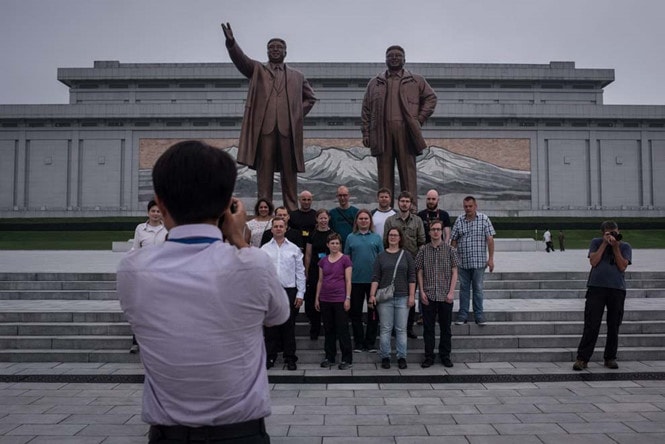Traveling to North Korea during times of tension
Travel agencies operating tours to the Democratic People's Republic of Korea have suffered significant damage from recent regional tensions.
Tourism is one of the few remaining economic sectors in North Korea that is not subject to UN sanctions. Reuters quoted the Korea Maritime Institute as saying that the smokeless industry brings in $44 million in revenue for the North each year.
For most foreigners, North Korea remains a mystery, and the number of Western tourists taking tours to learn about the country is about 4,000 a year, of which Americans account for 20%. However, that number has dropped sharply due to escalating tensions between Washington and Pyongyang.
Despite recent signs of an easing of tensions after South Korea and North Korea held their first talks in two years and the US suspended military exercises in the region, tensions remain a cause for concern for potential visitors.
 |
| Tourists take photos at the foot of the statues of President Kim Il-sung and leader Kim Jong-il in Pyongyang. |
Since President Donald Trump took office in January 2017, the US and North Korea have been constantly attacking each other, even threatening to destroy each other after Pyongyang's nuclear tests and missile launches. In particular, in September, the US State Department issued a ban on citizens traveling to North Korea following the death of student Otto Warmbier. He traveled to North Korea as a tourist but was detained for 17 months for allegedly stealing a propaganda poster in his hotel room. Warmbier was returned to the US in June 2017 in a coma and died shortly thereafter.
These developments have caused significant damage to travel agencies. CNN quoted Nicholas Bonner, co-founder of Koryo - one of the largest tour operators to North Korea (headquartered in Beijing, China), saying that the company's business has dropped by at least 50% since June 2017.
Dylan Harris, founder of Lupine Travel, a UK-based company that specializes in North Korea tours, said his business had also seen a significant drop in sales. “Especially in the second half of 2017, there were a lot of cancellations,” Harris said.
On the other hand, the profits that travel agencies earn from North Korea tours are not much. Mr. Bonner said that tour prices are set by the North Korean government and they collect the majority of the money. Foreign tour operators such as Koryo Company only receive a “modest” share after adjusting for some additional fees. “We have 12 people and bring quite a few tourists to North Korea, but we only make enough to survive,” he lamented.
Not only North Korea but also South Korea's tourism industry has been affected, especially the Pyeongchang Winter Olympics, which opened on February 9. CBS cited statistics showing that the organizers have only sold 655,000 tickets, accounting for 61% of the target. Fears of conflict breaking out on the inter-Korean peninsula are believed to be the cause of this situation, as the city of Pyeongchang is only 80 km from the inter-Korean border. In addition, Pyeongchang is a remote city, so it does not attract the attention of tourists, according to the tourism industry. However, the organizers are hoping that North Korea's agreement to send a delegation to the Olympics and resume dialogue can help improve the situation in the coming weeks.In addition, according to The Guam Daily Post, Guam, a US territory in the Pacific, is expected to lose about 40,000 tourists in fiscal year 2018 (starting in October 2017). The number of visitors to Guam in fiscal year 2017 reached a record high of 1.56 million, mainly from Japan, South Korea and China. However, due to North Korea's threats in August 2017 about a nuclear attack on the island, the number of tourists has continuously decreased, especially Japanese tourists, and Delta Air Lines has announced that it will stop operating the Tokyo - Guam route since January 8, 2018.
China reduces trade with North Korea
In a statement yesterday, the White House welcomed China's reduction in its trade with North Korea. China is North Korea's largest trading partner, but total trade between the two countries fell by 50% in December 2017. Specifically, China's imports from North Korea fell 81.6% to $54 million while exports fell 23.4% to $260 million, AP quoted a spokesman for the Chinese Customs Department as saying.
“The United States government is pleased that China is dramatically reducing its trade with North Korea. This action supports the United States-led global effort to apply maximum pressure until Pyongyang ends its illicit programs, changes its behavior, and moves toward denuclearization of the Korean Peninsula,” the White House said in a statement. North Korea has not yet responded to the information.

